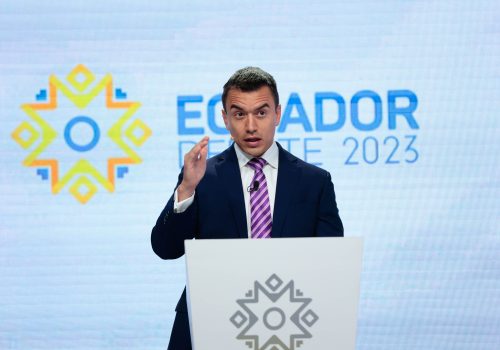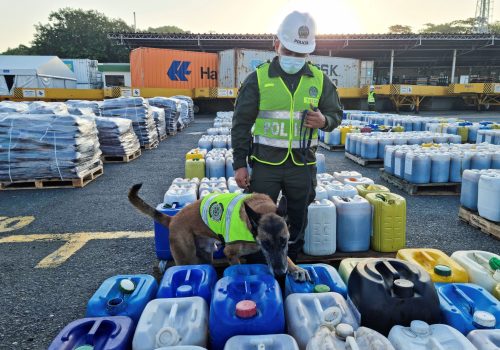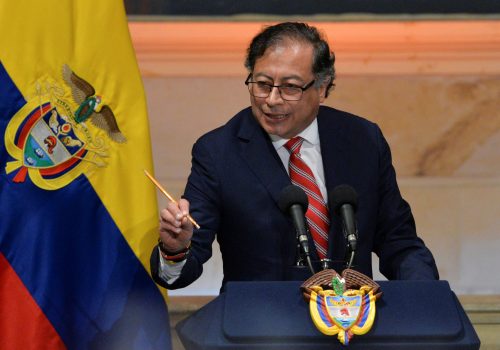Ecuador has declared ‘internal armed conflict’ against criminal gangs. What’s next?
Ecuadorian President Daniel Noboa started the new year with a declaration of “internal armed conflict” against criminal groups, coupled with a sixty-day state of emergency. Earlier this week, two leaders of criminal groups—José Adolfo Macías Salazar, alias “Fito,” of the group Los Choneros, and Fabricio Colón Pico, alias “Capitan Pico,” from Los Lobos—escaped from prison. The escape was accompanied by a series of prison riots, car bombs, kidnappings, and criminal attacks on a television channel and a university in Guayaquil. The Noboa administration’s first steps to address the violence and turmoil have been positive, but this will be a long battle and one for which Ecuador urgently needs international support.
In December 2023, there had been a glimmer of hope. Ecuadorian Attorney General Diana Salazar carried out a large-scale investigation called Caso Metástasis. This operation exposed the extensive reach of criminal groups within the country’s state institutions, carrying out seventy-five raids and arresting more than two dozen individuals linked to organized crime across police forces, the military, the judiciary, and other state entities. The operation revealed the gravity of the problem and the extent of these groups’ reach and infiltration into Ecuadorian democracy. Days after the operation, Salazar declared that she had received multiple death threats from Pico. The leader of Los Lobos, who escaped from prison on January 8, is suspected of being one of the key players behind the assassination of former presidential candidate Fernando Villavicencio.
Ecuador is now one of the most dangerous countries in the world, with a homicide rate of forty homicides per 100,000 inhabitants.
Noboa’s declaration of “internal armed conflict” allows for the mobilization of military forces to neutralize twenty-two crime groups in Ecuador. This declaration reveals the scale and complexity of the issue: The violent events that have haunted Ecuador in recent years surpass the traditional government-versus-criminal group battle, encompassing a larger fight for hostages, territory, and resources among criminal groups, with citizens often getting caught in the crossfire. Ecuador is now one of the most dangerous countries in the world, with a homicide rate of forty homicides per 100,000 inhabitants.
The state of emergency will allow the Noboa government to focus more military resources toward taking on these groups. However, inevitably, more attention to one group will mean less attention to others, causing a domino effect of violence that the country is likely to continue experiencing in the short term. Although the decision to declare a state of emergency and engage in armed conflict was the right one to address the security crisis, it is also one that will not be sustainable for long. The Noboa government faces financial constraints and a fiscal deficit, making it challenging to sustain a massive military operation against the profitable illicit economies managed by these criminal groups. An important next step for the government will be to determine exactly how to finance and budget for this new reality.
The Noboa government should keep prison control as an immediate priority. To stop crime in any country, authorities must be able to investigate crimes and count on their prison system to work. When prison systems fail, they can become recruitment and command-and-control centers for criminal groups, making it even harder to combat them. The prisons become liabilities for the government. While Noboa’s proposal to build new maximum-security prisons is a step in the right direction, it will take time to materialize. In the interim, prioritizing intelligence sharing and ensuring that the armed forces have necessary equipment are crucial. Surprisingly, Ecuador’s fragmented National Assembly has united and issued a statement, offering police and military officials amnesty from future prosecution for using excessive force in supporting the crackdown on organized crime, particularly in correctional facilities. This demonstrates a collective effort to address the crisis at the national level.
Given the complexity of the issue and the absence of immediate actions to address its root cause, Ecuador will likely see a spike of violence in the short term as armed forces fight organized crime. In moments like this, the international community must move beyond speeches and mere statements of support. It must provide military equipment, intelligence sharing, capacity building, and enhanced protection of key figures such as Salazar and Noboa, recognizing that their well-being is integral to the preservation of Ecuador’s democracy.
When prison systems fail, they serve as recruitment and command-and-control centers for criminal groups.
The impact of Ecuador’s crisis is not confined within its borders; it has repercussions for neighboring countries and, indirectly, the United States. South America plays a crucial role in global affairs, particularly with the significant increase in migration flows from the region, now surpassing migration from Central America’s Northern Triangle. Criminal organizations are taking advantage of these increased flows and profiting from human trafficking and exploitation.
When societies and communities are infiltrated by fear, crime, and a lack of opportunity, citizens turn to familial economies and a dependence on profit from illicit work. Young adults who join criminal organizations often end up dead, maimed, or in jail, but they still choose to join because they consider that the cost of living their entire life in fear and poverty is much higher than as part of these groups. This change in perception and blurred morality is something the Noboa government needs to address with the help of international partners and organizations such as the United Nations Office on Drugs and Crime. These organizations emphasize the importance of joint efforts that go beyond government-level cooperation to foster a comprehensive approach involving community leaders, civil society organizations, shelters, and schools.
For far too long, policymakers have focused on addressing illicit economies from the supply angle. It is imperative that they address the demand for illicit economies that fuel and finance these criminal enterprises, as well. By increasing costs at different parts of the supply chain and enhancing law enforcement and accountability that extends beyond the border, engaging in organized crime becomes riskier and less profitable. More importantly, the international actors who are significant drivers of demand for smuggling drugs, humans, and arms should collaborate to prosecute these organizations. Only then might governments be able to limit their survival in the long term.
The next couple weeks will be crucial in determining the democratic future of Ecuador. Each decision made by the government and its counterparts carries profound implications for the daily lives of citizens grappling with the consequences of organized crime’s deep infiltration in their country.
Isabel Chiriboga is an assistant director at the Adrienne Arsht Latin America Center and is originally from Ecuador.
Further reading
Mon, Oct 16, 2023
Four questions (and expert answers) about new Ecuadorian President Daniel Noboa
New Atlanticist By
On October 15, Noboa was elected Ecuador’s next president, beating out Luisa González, a protégé of former President Rafael Correa.
Thu, Nov 30, 2023
Advancing US-Colombia cooperation on drug policy and law enforcement
Report By
Consumption and price of the drug has remained stable in the United States in recent years. However, the current trend of falling coca leaf and cocaine prices in Colombia present a natural incentive for coca growers to find alternative forms of income, which could mean a higher rate of success for alternative development programs.
Mon, Nov 13, 2023
What Colombia’s ambitious new anti-drug plan means for US relations
New Atlanticist By
The Colombian government recently unveiled a new ten-year drug strategy, attempting to break from a half-century of policies that have failed to curb coca production.
Image: Ecuadorian soldiers arrive at the Zonal 8 prison for an inspection in Guayaquil, Ecuador, January 7, 2024. REUTERS/Vicente Gaibor del Pino


